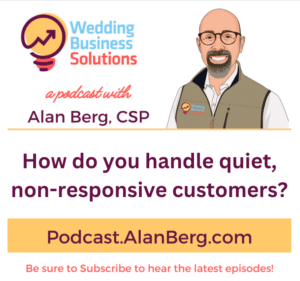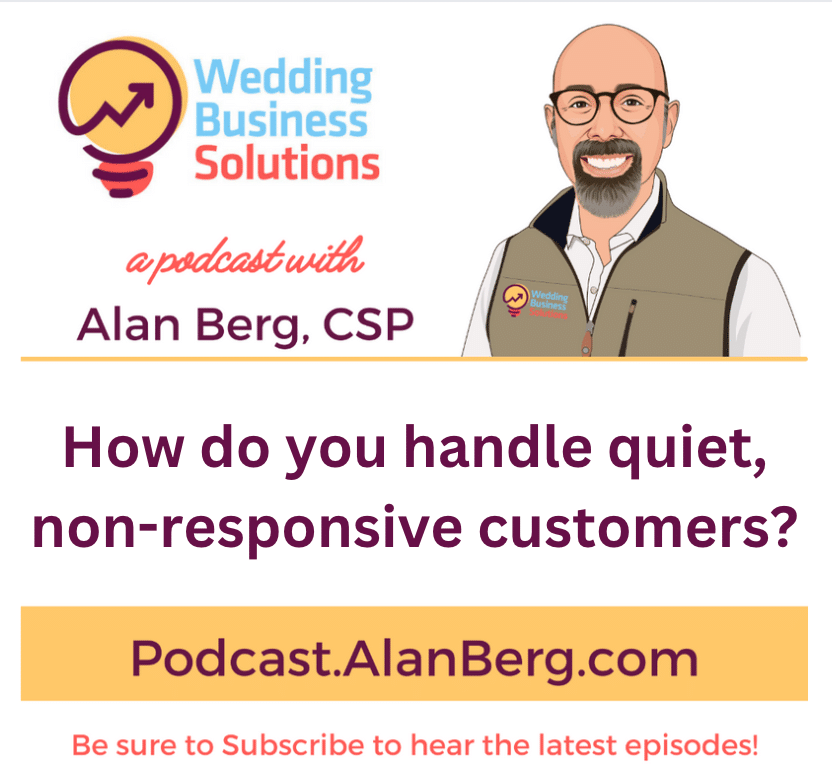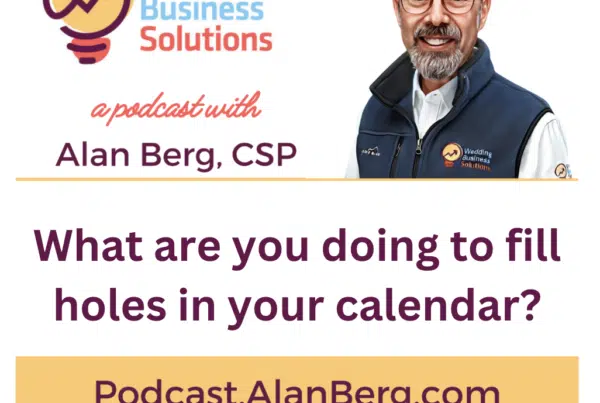 This is another listener suggestion, this time from Brian in South Florida. He had a couple in to his venue for a wedding and they weren’t responding to the questions that seem to work with other couples. He wanted to know what to do in situations like that. What are some different questions? How do you get the quiet ones talking?
This is another listener suggestion, this time from Brian in South Florida. He had a couple in to his venue for a wedding and they weren’t responding to the questions that seem to work with other couples. He wanted to know what to do in situations like that. What are some different questions? How do you get the quiet ones talking?
Listen to this new 9-minute episode for some questions you can use when your customers aren’t being responsive to your questions.
If you have any questions about anything in this, or any of my podcasts, or have a suggestion for a topic or guest, please reach out directly to me at [email protected] or visit my website Podcast.AlanBerg.com
Please be sure to subscribe to this podcast and leave a review (thanks, it really does make a difference). If you want to get notifications of new episodes and upcoming workshops and webinars, you can sign up at www.ConnectWithAlanBerg.com
– How do you handle the quiet customers? Listen to this episode and find out.
Hi, it’s Alan Berg. Welcome back to another episode of the Wedding Business Solutions Podcast. Here’s another listener suggestion this time for my friend Brian in Florida who runs a venue down there. And there was an event recently that he was also at. I’ve known him for a number of years and he came up to me and he had had this situation where a couple came in, it was for a wedding. A couple came to his venue and no matter what he was asking, he just wasn’t getting answers from them. They just weren’t receptive to the questions. The things that were working with other people just didn’t seem to be working with them. Trying to get them to talk about how they met or how they got engaged or whatever, which usually gets other people engaged in the conversation, gets them more animated ’cause they want to talk about that, just wasn’t working with this couple.
So what I told them is the first thing is we can’t put everybody into buckets. A phrase that I’ve used before, I’ve written about it in books, including my new book “Stop Selling and Help Them Buy Weddings and Events” is that almost everything works some of the time. Nothing works all the time. So that go-to question, that go-to phrase that works with everybody else isn’t working with these people, that isn’t a sign that it’s a bad question, that could just be who these particular people are. Now some people will have a good poker face. They don’t want to show their emotions. They don’t want to show their tells and poker speak there so that you don’t know how excited they are because then they might feel that you’ll take advantage of that. I remember when my in-laws were looking for their last car and I told them I’ll go with them to help them get a good deal. ‘Cause those of you that have read some of my background know that I sold cars for six years, Chrysler cars. I was one of the top 50 Chrysler salesmen in the country.
So I know a little bit about buying and selling cars. But I said, “I’m not going to go shopping with you. I’ll go with you to get a deal once you figure out what you want.” So they figured out what they wanted. They wanted a Honda CRV. They wanted a sunroof which meant they had to get an EX. They didn’t want leather. So really it came down to color. That was really the only thing.
So they wanted to go to the dealer that was closest to them because that’s where they’re going to want to service it. And I said, “Great, I’ll go with you there.” We go, we met the salesperson who was trying to play that they were more naive than they were about the business that they were newer or whatever. But I was seeing right through the act that they were putting on and they brought the car around. We went out to the car and my mother-in-law and father-in-law were like “Oh, this is perfect. This is exactly what we’re looking for.” I was like, “Shut up.” And they’re like, “No, this is exactly what I wanted.” I said, “Shut up. You’re taking away my leverage. You’re taking away my leverage by telling them this is exactly what you want and you love this.” They’re not leaving any room for ambiguity there for the salesperson that you are wanting to buy this particular car.
So I told them to go away and let me make the deal there, which I did. So, let’s think about this. If the people are just not being receptive to your questions, you want to maybe be a little bit more direct with them and say, “Well, it sounds like either you’re not sure what you’re looking for yet or you’re not liking what I’m showing you. Which of those is it?” And maybe get them to be a little bit more honest with you about which one it is. And if they’re not really sure what they want, say, “Well, I’d like to help you with this. Did you have any particular questions before you came? Or did you write down any questions that we didn’t get to?” Get them, ask them something like that. You don’t want to ask yes or no questions ’cause they’re not going to really give you an answer. You want to ask more open-ended questions and say, “Have you looked online or been to any weddings recently? Or maybe within the last year?” There’s a yes or no question. It doesn’t matter the answer. Chances are you know the answer ’cause they’ve probably looked online at either Instagram or Pinterest or Facebook or TikTok or whatever. And they probably have been to a wedding within the last year because people that are getting married tend to be in groups or age groups of other people that might be getting married, friends, relatives, coworkers, et cetera.
So chances are you’ll get a yes to that. But if the answer is no, then say, “Well, then you probably don’t have a lot of good things to go by. Would it be helpful if we looked at some photos together to get an idea for what you do and don’t want?” There’s a yes or no question but probably leading the witness. Would it be helpful? The answer is yes, of course it would be helpful. ‘Cause what you want to try to find out if they say they have looked online or have been to other weddings is what have you seen at other weddings or what have you seen online that you definitely want, you know you want this for your wedding. The more important question is, what have you seen or experienced that you definitely don’t want? ‘Cause those are the things you want to find out not to talk about. You don’t want to start telling about this thing that you think is wonderful and other people love and this particular couple or customer just doesn’t want it, hates it all together. Kind of like with music, right? Some weddings you go to and there’ll be lots of line dances and packed dance floors and some the couple has said, “No line dances. That’s it.” Okay? Doesn’t mean we can’t have a good time. Just means it’s going to be different.
So what have you seen that you definitely want? What have you seen that you don’t want? And if, again, if they’re not being very open about that then you might suggest some things like, let’s narrow this down and then take your particular service and think about it. So if you’re a photographer, are you going to have a lot of family at your wedding? Yes. Were you wanting to have family photos or not have any posed photos like that? And they might say, ’cause I’ve heard this from photographers all the time. Everybody says they want candid images, but then could you please take a picture of me and my family? Which is not a candid image, that’s a posed image, right? Even if you’re doing something a little different, a little fun, it’s still a posed image.
So people aren’t really sure to use the language the right way. They’re not necessarily going to do it. But again, what do you want? What do you not want? And you might have to then suggest some things and start building this for them because they don’t know how to articulate or they just want to keep their cards close to the vest and not give away too much ’cause they don’t want you to take advantage. And this is just some people that are just more skeptical. And I think that’s what my friend Brian ran into is people that were either just totally unsure of what they want or skeptical or maybe they just weren’t having a good day. Maybe they were running into decision fatigue that they’re seeing venue after venue after venue. Which actually is a good sign for you because if somebody has been shopping around a lot and is just done shopping, they will buy from the next person who makes them feel valued and who asks for the sale.
So that’s called decision fatigue. It’s like, I’m done. I just don’t want to, I don’t want to look around anymore. Decision paralysis, I don’t know what I want. But decision fatigue is like, I’m done looking. Enough already, let’s just do something here. I think we’ve all run into that on Amazon. Sometimes you run into decision paralysis where you just can’t decide and other times you’re like, you know what? That’s good enough. Let me just buy that one. That’s it, done. There we go. So what do you do with people that are just being quiet and not being responsive? You have to change your playbook. You might need to have your A playbook for most of your customers and then have a B playbook for other people with those questions that are going to dig a little deeper and that you might not ask the A-list customers because they’re responding to your regular questions.
You might have to do what we don’t normally do which is start suggesting things we want them to tell us. So it is still asking better questions. It’s just coming up with questions you haven’t used before, haven’t thought of, and just trying to get them to open up a little bit more. Remember not everybody wants to talk about how they met or how they got engaged. Not everybody likes to share things like that. So those questions that might work for most of your couples may not work for a particular one. Doesn’t mean you’re doing anything wrong, it just means that’s not the way to get this customer to see that you are the right fit. Well, I hope this gave you something to think about, maybe some tools, maybe something to help you. Let me know other suggestions for topics. Thank you Brian, for suggesting this one.
I’m Alan Berg. Thanks for listening. If you have any questions about this or if you’d like to suggest other topics for “The Wedding Business Solutions Podcast” please let me know. My email is [email protected]. Look forward to seeing you on the next episode. Thanks.
Listen to this and all episodes on Apple Podcast, YouTube or your favorite app/site:
- Apple Podcast:
- YouTube: www.WeddingBusinessSolutionsPodcast.tv
- Spotify: https://spoti.fi/3sGsuB8
- Stitcher:
- Google Podcast:
- iHeart Radio: https://ihr.fm/31C9Mic
- Pandora:
©2023 Wedding Business Solutions LLC & AlanBerg.com





